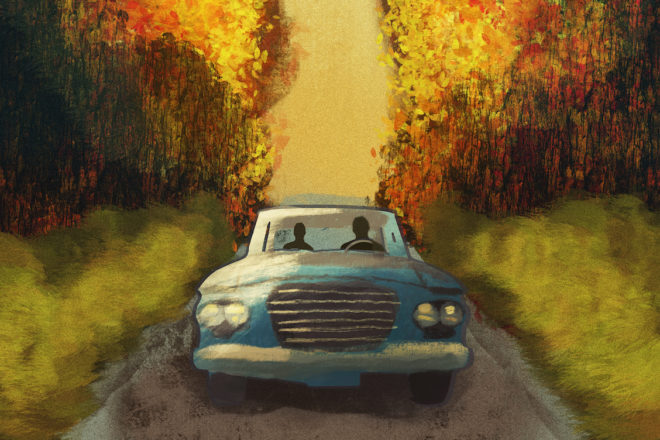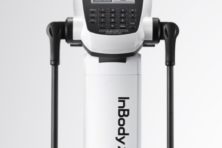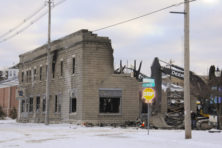“The Body of the Law”
- Share
- Tweet
- Pin
- Share

This week we’re sharing one of the honorable-mention nonfiction works from the 2022 Hal Prize contest. The Peninsula Pulse presents the annual Hal Prize competition for fiction, nonfiction, poetry and photography in partnership with the Peninsula School of Art and Write On, Door County. In David Studebaker’s “The Body of the Law,” the author recalls a time when he hitchhiked to his university and the interesting man who picked him up.
“The Body of the Law”
by DAVID STUDEBAKER
Hal Prize nonfiction honorable mention
It’s a sunny fall morning in northern Indiana in the early 1960s. The trees are just in the first stage of gaining fall colors. There’s a friendly breeze, making the colors almost sparkle on the fluttering leaves. It looks like it’s going to be a pretty day. Mom pulls the car to the side of Cable Line Road just short of the intersection with State Highway 19.
“Are you sure you want to do this? We can take you down to school this evening.” I can tell she was visualizing wild drivers, drunks and all kinds of unsavory people. She’s a great mom and very concerned for the safety of her little boy.
This little boy is 6’4″ tall, 220 pounds and a sophomore in college. Admittedly I’m pretty green about the ways of the world, but I have an excess of unjustified self-confidence. The real reason for this venture is every now and then over the past two or three years, Dad has shared stories of his hitchhiking adventures. Shucks, if Dad could do it, why can’t I?
I am leaving out the fact that Dad’s hitchhiking was in the late Depression years when hitchhiking was common. News traveled a lot more slowly then, and generally even bad news didn’t travel as far. Stories about the awful things that sometimes happened to hitchhikers were minimized or ignored with an attitude of “That kind of thing doesn’t happen around here!”
“No, Mom. I’ll be fine. Dad used to do this all the time when he was in college. It saves you and Dad the time and effort and cost of driving me. Besides, if I hitchhike, I can come home for visits more frequently.” I am going for Mom’s soft spot. She has a lot of soft spots.
Mom grimaced, but Dad had already given it his mixed OK. He had some of the same reservations as Mom, but he also wished he were 19 again, with more sense of adventure than common sense. Dad had said, “Let the boy learn. He’s a big boy now and has to figure out for himself how to get along in the real world.” Dad and I carried the day.
I shut the car door and wave Mom away. Mom winces, gives me one more sorrowful look and slowly pulls away, heading back toward home.
This is my first effort at a hitchhiking trip longer than the four or five miles from town or church or high school to our home in the country. This trip will be about 90 miles. I’m almost as nervous as I am excited.
I pick up my well-used old suitcase, held shut with the help of a length of clothesline rope tied with a square knot. I am prepared with a foot-long sheet of white poster board proudly displaying my destination, “PURDUE,” printed in two-inch-high, heavy black crayon letters, taped to the side of my suitcase. In case that wasn’t enough message, I also have a similar handheld sign, similarly imprinted, to hold up at chest height while I show my best “I want to be your friend” smile to each passing driver.
I walk over to my carefully planned starting point on the southbound side of the state highway north of the stoplight. Cars and trucks will be stopping here, or at least slowing down a little. Drivers will have a chance to read my signs and appreciate my non-threatening appearance.
It really is a pretty morning. The temperature is cool, countered by the warm fall sunshine. No leaves are falling yet. The gentle breeze made it a perfect fall day. A great day for a new hitchhiking adventure.
I’m trying to remember all my dad’s tips. “Look clean, innocent and harmless. Smile at people as they come by. Hold your sign so it can be easily seen. Even if they just pass you by, keep smiling. You might be making it easier for the next hitchhiker they come across.” There was more, quite a bit more. Dad was never guilty of not giving enough instruction. But it really felt good having Dad treat me more like an equal than as a kid who has trouble getting his shoes on the right feet.
I stand there next to the highway for about fifteen or twenty minutes of waiting, smiling big, occasionally inhaling diesel exhaust, until IT happens. A plain, four-door, medium-blue compact sedan slows down for the stoplight, then edges over to the highway berm just past where I’m standing. It’s the basic model of South Bend’s iconic economy car, a Studebaker Lark. The driver turns around in his seat and waves at me to come on to him. Picking up my suitcase, I trot up to the passenger side of the car.
The man leans over and calls out the passenger window, “Just put your suitcase in the back seat. Push those sacks aside a little if you need to. But be careful moving stuff.” Opening the back passenger door, I see three or four large paper bags on the rear bench seat. They look like grocery sacks, but bigger and made of heavier weight paper. There are also two or three smaller cartons, securely shut by hand with overlapping folded flaps without tape.
I do as instructed. When I push the sacks against each other to make space for my suitcase, they make sort of a muffled clunking sound. They’re heavy, making sloshing sounds when I shove on them. They feel and sound like several of those big glass jugs filled and ready to be used on the office water coolers.
I crowd my suitcase onto the back seat between the door and the big sacks. If the door pops open (not likely), my suitcase and goodness knows what else will probably fall out. I close the back door with my suitcase and sign stuffed in place and climb into the front seat. My heart is beating hard. My hands are a little moist. My adventure is beginning.
The car is relatively new. The inside of the car is neat, but very plain. Like almost all basic sedans, the car is equipped with bench seats front and back. The driver is clean shaven, as am I (and almost every other male in Indiana except for those who are Amish). He is wearing a white shirt and plain, navy blue tie. His medium-blue suit coat is hanging from the coat hook above the driver’s side back window. His suit and tie almost match the car’s color. My first thought is that his outfit either looks like a uniform or just shows a lack of imagination.
My benefactor driver is saying something. “Pardon,” I say. “I’m afraid I was thinking of what I have to do when I get down to school.” It’s not true, but it’s the best I can do on the spur of the moment.
“Hi, I’m Gus.”
I reply, “Glad to meet you, Gus. I’m Dave. I appreciate you picking me up. I’m kind of new at this.”
“How long have you been hitching? What year are you at Purdue?”
“Just started hitching regularly this year. I’m a sophomore. I’m in mechanical engineering.” I am pretty proud of being an engineering student at a well-known Big 10 university.
“Engineering, huh? I sort of wanted to go into something like engineering, but my folks didn’t have much money, so I dropped out after my first year.”
“That’s too bad. What did you do then?”
“I joined the Air Force. It was pretty good duty. I got assigned to the Air Police Group, got training and was stationed in the U.S. I spent my four years, decided that was enough, so I didn’t re-enlist.”
About then I glance up at the sun visor tucked against the car roof in front of me. Attached to it is a rectangular document holder with a large, see-through cover displaying its contents. Trying not to be obvious, I strain to read what the document says. It looks like some kind of license. There is some big print and a lot of little print. I can easily make out the big print. It says:
Police Department
City of South Bend, Indiana
Then in slightly smaller, very bold print, I see it says, This Vehicle for Official Use Only.
OK, now I am officially nervous. I’m struggling to pay attention to what Gus is saying while all kinds of thoughts are whirling around in my head. At the top of my list is the fact that hitchhiking is illegal in Indiana. I know that; almost everyone knows that. But that particular law is also generally ignored by almost everyone. On the other hand, most people don’t get picked up by a South Bend Police Department car. Especially on their first ride. I’m definitely feeling very nervous – scared, actually – but trying not to show it.
I try to say something intelligent. “Oh, what did you do after that?”
“I tried this and that, different things. Then I got a job with the South Bend Police crime lab. I guess they figured my Air Police training might be helpful. It never was helpful. But it’s a good job, good hours, not very hard work and decent pay. Most of the time I get home at night to be with my family. Not tonight, though. I’m headed to Indianapolis today to the State Crime Lab. I can take you as far as Rochester. You’ll be almost halfway to Purdue.”
We are both quiet for a few minutes. Meantime, I try to calm my nerves. I figure if he didn’t say anything about me doing illegal hitchhiking, he must not be worried about it. I conclude this is a classic case of no news is good news.
I decide to make some more conversation, try to be good company.
“What are you going to the State Crime Lab for? A meeting or some special training?”
“No. There was a very suspicious death in South Bend a couple of weeks ago. A guy who always was getting into trouble appears to have gotten on the wrong side of someone a lot meaner than he was. But we’re not sure. He could have died of natural causes, but he was only in his forties and, other than having very bad judgment, seemed pretty healthy. We think he might have been poisoned.”
“Oh,” I gulp. This is the kind of talk I was used to hearing in a radio show, not in a car with a guy in a blue suit and an official police department ownership document attached to the sun visor. “What made you think he was poisoned?”
Gus describes some of the details of the man’s death, most of which I would rather not hear, particularly in such detail. Obviously Gus enjoys his job. Obviously he was enjoying impressing this young kid (me) with the nitty-gritty importance and complexity of working in a police crime lab. I am impressed, but mostly I am just trying to keep my breakfast to myself.
Trying to change the subject, I interrupt Gus’ detailed description of how different poisons make people die differently and how just from looking at the dead body, you can make a pretty good guess of the general category of poison involved.
“What’s in the packages in the back seat?”
“Those? The big sacks have large bottles with some special preserving fluid in them. Parts of the dead man’s body are in a couple of those. Some of his internal organs are in the other two sacks. Same thing, in big bottles full of special preserving fluid. The cartons have small containers with samples from the partially eaten food we found on the table next to his body. There’s also bottles with whatever was in his coffee cup and a couple of glasses that were on the counter. The State Crime Lab has the equipment to analyze everything, looking for evidence this guy was poisoned and, if so, with what. All I’m doing is delivering the parts and returning the test results back to South Bend. Oh, the best part. I get to watch all the testing! That will be really interesting.”
Obviously Gus and I have very different opinions of what is “interesting.” Much to my relief, it isn’t long until we reached the city of Rochester. Gus takes me to the point where his path will branch from mine. We stop near the busy intersection of Indiana 25 and U.S. 31 for him to drop me off.
“You should be able to get a ride to Logansport on State Road 25 from here,” he says. “With some luck and another ride out of Logansport on Route 25, you should be at school in time for a late lunch.” Gus winks at me.
I climb out of the Official Police Department Vehicle, retrieve my suitcase and sign from next to Gus’ memorable load of person parts. I hope his very silent passenger hasn’t penetrated my suitcase’s contents in any way. I stick my head back in the front car door to thank Gus for the ride and the interesting conversation.
He grins and responds, “You’re welcome. It’s nice to have company on these long, boring drives.” He grins again, bigger this time, and says, “Oh, one more thing. You should know that hitchhiking is illegal in Indiana. Especially on a state or U.S. highway.” With that, Gus gives a cheerful wave and drives off.

It takes me a few minutes of contemplation there by the side of the road before I can gather myself together, move to a logical spot to solicit traffic heading south out of town on Indiana 25, hold up my “PURDUE” sign and stick out my hand, thumb up.
From 1962 to 2015, David Studebaker worked in computer-software development and consulting. From the early 1960s on, he did technical writing for fun and publication, and now retired, he’s trying his hand at nontechnical writing.
Want to read more? Have a lover of literature in your life? Visit doorcountypulse.com/shop to purchase the first and second volumes of 8142 Review. By purchasing them, you support the literature arts in the community, the continuation of the Hal Prize and 8142 Review.






